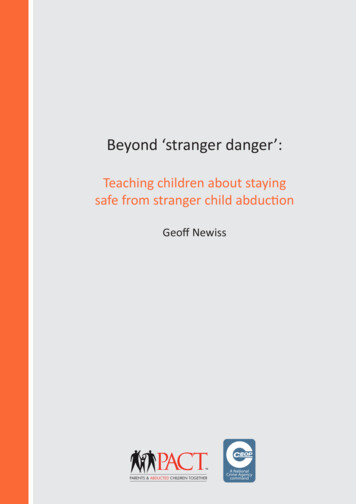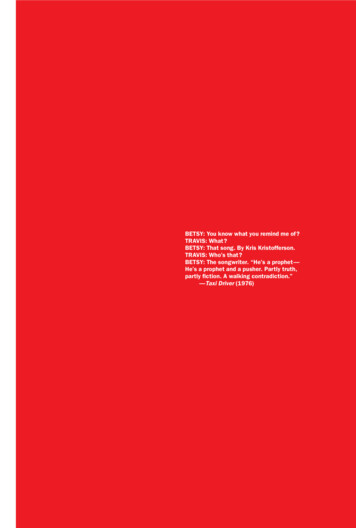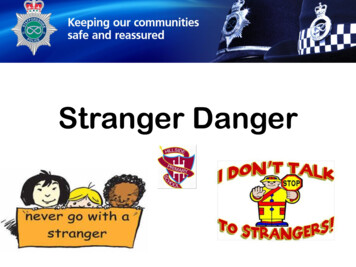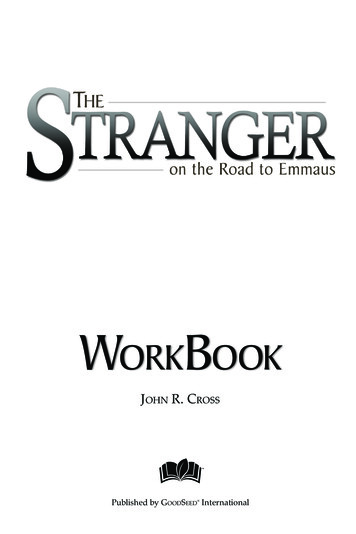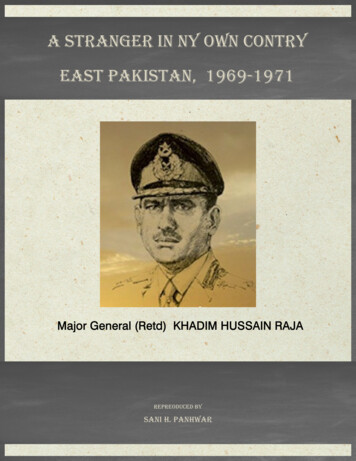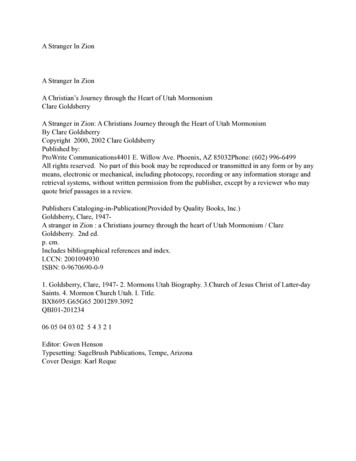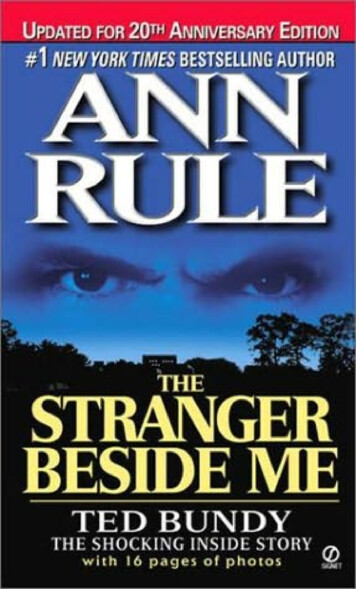
Transcription
ted bundy.txtTHE STRANGER BESIDE MEAnn RuleANN RULE'S GRIPPING TRUE-LIFE STORIES OF PASSION AND MURDER . . .D LUST KILLER. One of the most terrifying true-crime stories of ourtime . One by one the young women vanished. Pretty Linda Slawsondisappeared while selling encyclopedias door to door. College girl JanWhitney never completed her two-hour drive home.Updated withshocking new material about the monstrous murderer.(154770- 4.95)D POSSESSION. In a savage wilderness, a psychopathic killer sets outto make a woman his sexual slave . Joanne Lindstrom was a beautifulyoung wife on a camping trip with her husband in the Northwest whenDuane entered their lives. Then her husband was gone and the only manin her life was this stranger who demanded total possession.(128966- 4.95)D THE WANT-AD KILLER. The terrifying true tale of a master manipulatorof women. Brilliant and warped, he mocked the law in his orgy of savagesex and slaughter from Alaska to Washington State to Minnesota.(142039- 3.50)D THE STRANGER BESIDE ME. Working on the biggest story of her life,journalist Anne Rule didn't know that Ted Bundy, her friend and co-workerat a psychological counseling hotline, was the slayer she was hunting.Today Bundy is in prison, convicted of mass sexual abuse and murder;here Rule tells the shocking story of this "allAmerican boy" turnedkiller. (137116- 4.50) *Prices slightly higher in Canada.Buy them at your local bookstore or use this convenient coupon forordering. ,NEW AMERICAN LIBRARY P.O. Box 999, Bergenfield, New Jersey 07621Please send me the books I have checked above. I am enclosing (please add 1,00 to this order to cover postage and handling). Sendcheck or money order-no cash or C.O.D.'s. Prices and numbers are subjectto change without notice.Page 1
ted bundy.txtINAL BOOKS ARE AVAILABLE AT QUANTITY DISCOUNTS WHEN USED TOPROMOTEPRODUCTS OR SERVICESFORINFORMATION PLEASE WRITE TO PREMIUMMARKETING DIVISION NEW AMERICAN LIBRARY, 1633 BROADWAY, 'NEW YORK, NEW YORK 10019.Copyright 1980 by Anne Rule Afterword copyright 1986 by Anne Rule.All rights reserved. For information addressW. W. Norton and Company, Inc500 Fifth Avenue, New York, NY 10110.This is an authorized reprint of a hardcover editionpublished by W. W. Norton and Company, IncThe hardcover edition was published simultaneously inCanada by George J. McLeod Limited, Toronto,First Signet Printing, July, 1981141516Printed in the U. S. A.PUBLISHER'S NOTEFor legal reasons, some of the names in this book have been changed.This book is dedicated to my parents:Sophie Hansen Stackhouse andthe late Chester R. Stackhouse .for their unfailing love and support,and because they always believed. . «Page 2
ted bundy.txtAcknowledgmentI have been fortunate indeed to have had the support of many individualsand organizations in writing this book. Without their help and emotionalbacking, it would have been impossible, and I would like to thank them:The Committee of Friends and Families of Victims of Violent Crimes andMissing Persons; the Seattle Police Department Crimes Against PersonsUnit; the King County Police Department Major Crimes Unit; formerSheriff Don Redmond of Thurston County; Lieutenant James Stovall ofthe Salem, Oregon Police Department; Gene Miller of the Miami Herald;George Thurston of the Washington Post; Tony Polk of the Rocky MountainNews; Rick Barry of the Tampa Tribune; Albert Govoni, editor of TrueDetective; Jack Olsen; Yvonne E.W. Smith; Amelia Mills; Maureen andBill Woodcock; Dr. Peter J. Modde, and my children, Laura, Leslie, Andyand Mike, who gave up months of their mother's companionship so thatI might write.And tortures him now more, the more he sees Of pleasure not for himordained: then soon Fierce hate he recollects, and all his thoughtsOf mischief, gratulating, thus excites:"Thoughts, whither have ye led me? with what sweetCompulsion thus transported to forgetWhat hither brought us? hate, not love, nor hopeOf Paradise for Hell, hope here to tasteOf pleasure, but all pleasure to destroy,Save what is in destroying; other joyTo me is lost."Paradise Lost: Book IX (Lines 469-79)Page 3
ted bundy.txtPrefaceIThis book began a half dozen years ago as an entirely different work.It was to have been a crime reporter's chronicling of a series ofinexplicable murders of beautiful young women. By its very nature, itwas to have been detached, the result of extensive research. My life,certainly, would be no part of it. It has evolved instead into anintensely personal book, the story of a unique friendship that hassomehow transcended the facts that my research produced. As the yearspassed, I learned that the stranger at the very vortex of anever-spreading police probe was not a stranger at all; he was my friend.To write a book about an anonymous murder suspect is one thing. To writesuch a book about someone you have known and cared for for ten yearsis quite another. And yet, that is exactly what has happened. My contractto write this book was signed many months before Ted Bundy became theprime suspect in more than a dozen homicide cases. My book would notbe about a faceless name hi a newspaper, about one unknown out of theover one million people who live in the Seattle area; it would be aboutmy friend, Ted Bundy.We might never have met at all. Logically, statistically,demographically, the chance that Ted Bundy and I should meet and becomefast friends is almost too obscure to contemplate. We have lived inthe same states at the same timenot once but many times-but the fifteenyears between our ages precluded our meeting for many years.When we did meet in 1971, I was a plumpish mother of four, almost forty,nearing divorce. Ted was twenty-four, a brilliant, handsome senior inpsychology at the University of Washington. Chanfce made us partnerson the crisis lines at Seattle's Crisis Clinic on the Tuesday nightlate shift. Rapport, an almost instant rapport, made us friends.I was a volunteer on the phones, and Ted earned two dollars an houras a work-study student. He looked forward toPage 4
ted bundy.txtXIVPREFACElaw school, and I hoped that my fledgling career as a freelance writermight grow into something that would provide a fulltime income for myfamily. Although I had a bachelor's degree in creative writing fromthe University of Washington, I had done little writing until 1968 whenI'd become the Northwest correspondent for True Detective Magazine andher sister publications, all specializing in fact-detective stories.My beat was major crime stories in a territory extending from Eugene,Oregon to the Canadian border.It proved to be a field for which I was well suited. I'd been a Seattlepolicewoman in the 1950s and the combination of my interest in lawenforcement and my education in writing worked. I had minored in abnormalpsychology at the University and had gone on to obtain an associatedegree in police science to enable me to write with some expertise aboutthe advances in scientific criminal investigation. By 1980,1 would havecovered more than 800 cases, principally homicides, all up and downthe Northwestern coast, gaining the trust of hundreds of homicidedetectives-one of whom would give me the somewhat unsettling accolade,"Ann, you're just like one of the boys."I'm sure that our mutual interest in the law drew Ted and me together,gave us some common ground for discussion--just as our interest inabnormal psychology did. But there has always seemed to be somethingmore, something almost ephemeral. Ted himself referred to it once ina letter mailed from a jail cell, one of the many cells he would occupy."You've called it Karma. It may be. Yet whatever supernatural forceguides our destinies, it has brought us together in some mind-expandingsituations. I must believe this invisible hand will pour more chilledChablis for us in less treacherous, more tranquil times to come. Love,ted."The letter was dated March 6, 1976, and we were never to come face toface again outside prison walls or a tightly secured courtroom. Buta curious bond remains.And so Ted Bundy was my friend, through all the good times and the badtunes. I stuck by him for-many years, hoping that none of the innuendoPage 5
ted bundy.txtwas true. There are few who will understand my decision. I'm sure thatit will anger many. And, with it all, Ted Bundy's story must be told,and it must be told in its entirety if any good can evolve from theterrible years: 1974-1980.I have labored for a long time with my ambivalence aboutPREFACEXVTed. As a professional writer, I have been handed the story of a lifetime,a story any author prays for. Prohably there is no other writer so privyto every facet of Ted's story. I did not seek it out, and there havebeen many, many, long nights when I wished devoutly that things mighthave been different -that I was writing about a complete stranger whosehopes and dreams were no part of my own. I have wanted to go back to1971, to erase all that has happened, to be able to think of Ted asthe open, smiling young man I knew then.Ted knows I am writing this book. He has always known, and he hascontinued to write to me, to call me. I suspect that he knows I willtry to show the whole man.Ted has been described as the perfect son, the perfect student, theBoy Scout grown to adulthood, a genius, as handsome as a movie idol,a bright light in the future of the Republican Party, a sensitivepsychiatric social worker, a budding lawyer, a trusted friend, a youngman for whom the future could surely hold only success. He is all ofthese things, and none of them. Ted Bundy fits no pattern at all; youcould not look at his record and say: "See, it was inevitable that hewould turn out like this." In fact, it was incomprehensible.ANN RULEJanuary 29,1980Page 6
ted bundy.txt2 THE STRANGER BESIDE MEUniversity of Michigan campus, and he could have stayed there. There'dbeen enough money left from the stash he'd hidden in jail to pay fora twelve-dollar room at the YMCA but Michigan nights in January canbe unrelentingly icy, and he didn't have warm clothing.He'd been to Florida before. Back in the days when he was an energeticyoung worker for the Republican Party he'd received a trip to the 1968convention in Miami as part of his reward. But, as he pored over collegecatalogues in the University of Michigan Library, he wasn't thinkingof Miami.He looked at the University of Florida in Gainesville and dismissedit summarily. There was no water around Gainesville, and, as he wouldsay later, "It didn't look right on the map--superstition, I guess."Tallahassee, on the other hand, "looked great." He had lived the betterpart of his life on Washington's Puget Sound and he craved the sightand smell of water: Tallahassee was on the Ochlockonee River which ledto the Apalachee Bay and the vastness of the Gulf of Mexico.He knew he couldn't go home again, ever, but the Florida Indian namesreminded him a little of the cities and rivers of Washington with theirNorthwestern tribal names.Tallahassee it would be.He had traveled comfortably up until New Year's Day. The first nightout was a little hard, but walking free was enough in itself. When he'dstolen the "beater" off the streets in Glenwood Springs, he'd knownit might not be up to making the snow-clogged pass into Aspen, but he'dhad little choice. It had burned out thirty miles from Vail-forty milesfrom Aspen-but a good Samaritan had helped him push the car off theroad, and given him a ride back to Vail.From there, there was the bus ride to Denver, a cab to the airport,and a plane to Chicago, even before they'd discovered he was gone. Hehadn't been on a train since he was a child and he'd enjoyed the Amtrakjourney to Ann Arbor, having his first drinks in two years in the clubcar as he thought of his captors searching the snowbanks further andfurther behind him.In Ann Arbor, he'd counted his money and realized that he would haveto conserve it. He'd been straight since leaving Colorado, but he decidedPage 7
ted bundy.txtone more car theft didn't matter. He left this one in the middle ofa black ghetto in Atlanta with the keys in it. Nobody could ever tieit to Ted Bundy-THE STRANGER BESIDE ME 3not even the FBI (an organization that he privately considered vastlyoverrated,) who had just placed him on their Ten-Most-Wanted List.The Trailways bus had delivered him right into the center of downtownTallahassee. He'd had a bit of a scare as he got off the bus. He thoughthe'd seen a man he'd known in prison in Utah, but the man had lookedright through him, and he realized he was slightly paranoid. Besides,he didn't have enough money to travel any further and still afford aroom to rent.He loved Tallahassee. It was perfect, dead, quiet-a hick town on Sundaymorning. He walked out onto Duval Street, and it was glorious. Warm.The air smelled good and it seemed right that it was the fresh dawnof a new day. Like a homing pigeon, he headed for the Florida StateUniversity campus. It wasn't that hard to find. Duval cut across Collegeand he turned right. He could see the old and new capitol buildingsahead, and, beyond that, the campus itself.The parking strips were planted with dogwood trees-reminiscent ofhome-but the rest of the vegetation was strange, unlike that in theplaces from which he'd come. Live oak, water oak, slash pine, date palms,and towering sweet gums. The whole city seemed to be sheltered by trees.The sweet gum branches were stark and bare in January, making the vistaa bit like a northern winter's, but the temperature was nearing 70already. The very strangeness of the landscape made him feel safer,as if all the bad times were behind him, so far away that everythingin the previous four years could be forgotten, forgotten so completelythat it would be as if it had never happened at all. He was good atthat; there was a place he could go to in his mind where he truly couldforget. Not erase; forget.As he neared the Florida State campus proper, his euphoria lessened;Page 8
ted bundy.txtperhaps he'd made a mistake. He'd expected a much bigger operation inwhich to lose himself, and a proliferation of For Rent signs. Thereseemed to be very few rentals, and he knew the classifieds wouldn'thelp him much; he wouldn't be able to tell which addresses were nearthe university.The clothing that had been too light in Michigan and Colorado wasbeginning to feel too heavy, and he went to the campus bookstore wherehe found lockers to stow his sweaters and hat.4 THE STRANGER BESIDE MEHe had 160 left, not that much money when he figured he had to renta room, pay a deposit, and buy food until he found a job. He found thatmost of the students lived in dormitories, fraternal houses, and ina hodge-podge of older apartment and rooming houses bordering the campus.But he was late in arriving; the term had started, and almost everythingwas already rented.Ted Bundy had lived in nice apartments, airy rooms in the upper storiesof comfortable older homes near the University of Washington and theUniversity of Utah campuses, and he was less than enchanted with thepseudo-Southern-mansion facade of "The Oak" on West College Avenue.It drew its name from the single tree in its front yard, a tree asdisheveled as the aging house behind it. The paint was fading, and thebalcony listed a bit, but there was a For Rent sign in the window.He smiled ingratiatingly at the landlord and quickly talked his wayinto the one vacancy with only a 100 deposit. As Chris Hagen, he promisedto pay two months rent- 320within a month. The room itself was asdispirited as the building, but it meant he was off the streets. Hehad a place to live, a place where he could begin to carry out the restof his plans.Ted Bundy is a man who learns from experience-his own and others'. Overthe past four years, his life had changed full circle from the worldof a bright young man on his way up, a man who might well have beenGovernor of Washington in the foreseeable future, to the life of a conPage 9
ted bundy.txtand a fugitive. And he had, indeed, become con-wise, gleaning whateverbits of information he needed from the men who shared his cell blocks.He was smarter by far than any of them, smarter than most of his jailers,and the drive that had once spurred him on to be a success in the straightworld had gradually redirected itself until it focused on only one thing:escape-permanent and lasting freedom, even though he would be, perhaps,the most hunted man in the United States.He had seen what happened to escapees who weren't clever enough to plan.He knew that his first priority would have to be identification papers.Not one set, but many. He had watched the less astute escapees led backto their prisons, and had deduced that their biggest mistake had beenthat they were stopped by the law and had been unable to produce I.D.THE STRANGER BESIDE ME 5that would draw no hits on the "big-daddy" computers of the NationalCrime Information Center in Washington D.C.He would not make that fatal error; his first chore would be to researchstudent files and find records of several graduates, records withoutthe slightest shadows on them. Although he was thirty-one, he decidedthat in his new lives, he would be about twenty-three, a graduate student.Once he had that secure cover, he would find two other identities thathe could switch to if his antennae told him he was being observed tooclosely.He also had to find work-not the kind of job for which he was infinitelyqualified: social service, mental health counselor, political aide,legal assistant-but a blue collar job. He would have to have a socialsecurity number, a driver's license, and permanent address. The latter,he had; the rest he would obtain. After the rental deposit, he had only 60 left, and he'd been shocked already to see the inroads inflationhad made into the economy while he'd been incarcerated. He'd been surethat the several hundred dollars he'd begun his escape with would lasthim a month or two, but now it was almost gone.He would rectify that. The program was simple. First the I.D., nextPage 10
ted bundy.txtthe job, and last, but most important, he would be the most law-abidingcitizen who ever walked a Florida street. He promised himself that hewould never get so much as a jaywalking ticket, nothing whatever thatwould cause law enforcement officers to ever glance his way.He was now a man without any past at all. Ted Bundy was dead.As all of his plans had been, it was a good plan. Had he been able tocarry it out to the letter, it is doubtful that he would ever have beenapprehended. Florida lawmen had homicide suspects of their own to keeptabs on, and crimes as far afield as Utah or Colorado held little interestfor them.Most young4men, among strangers, in a strange land, with only 60 totheir names, jobless, and in need of 320 within the month, might beexpected to feel a stirring of panic at the unknown quality of the daysahead."Chris Hagen" felt no panic. He felt only a bubbling elation and a vastsense of relief. He had done it. He was free, and he no longer had torun. Whatever lay ahead paled in comparison with what the morning ofJanuary 9th had meant« THE STRANGER BESIDE MEto him as 1977 drew to a close. He was relaxed and happy as he fellasleep in his narrow bed in the Oak in Tallahassee.He had good reason to be. For Theodore Robert Bundythe man who was nomore-had been scheduled to go on trial for first degree murder inColorado Springs, Colorado at9 A.M. on January 9th. Now that courtroom would be empty.The defendant was gone.,The Ted Bundy who "died" and was reborn as Chris Hagen in TallahasseePage 11
ted bundy.txton January 8, 1978 had been a man of unusual accomplishment. While muchof his life had seemed to fit into the flat wasteland of the middleclass, there was also much that did not.His very birth stamped him as different. The mores of America in 1946were a world removed from the attitudes of the '70s and '80s. Today,illegitimate births make up a substantial proportion of deliveries,despite legalized abortions, vasectomies, and birth control pills.There is only token stigma toward unwed mothers and most of them keeptheir babies, merging smoothly into society.It was not that way in 1946. Premarital sex surely existed-as it alwayshas-but women didn't talk about it if they indulged, not even to theirbest friends. Girls who engaged in sex before marriage were consideredpromiscuous, though men could brag about it. It wasn't fair, and itdidn't even make much sense, but that's the way it was. A liberal atthat time was someone who pontificated that "only good girls get caught."Programmed by anxious mothers, girls never doubted the premise thatvirginity was an end in itself.Eleanor Louise Cowell was twenty-two, a "good girl," raised in a deeplyreligious family in northwest Philadelphia. One can only imagine herpanic when she found she had been left pregnant by a man she refersto today only as "a sailor." He left her, frightened and alone, to faceher strict family. They rallied around her, but they were shocked andsaddened.Abortion was out of the question. It was illegal--carried out in murkyrooms on dark streets by old women or doctors who'd lost their licenses.Furthermore, her religious training forbade it. Beyond that, shealready loved the baby growing within her. She couldn't bear the thoughtof putting the child78 THE STRANGER BESIDE MEup for adoption. She did the only thing she could; when she was sevenmonths pregnant, she left home and entered the Elizabeth Lund Home forPage 12
ted bundy.txtUnwed Mothers in Burlington, Vermont.The maternity home was referred to by waggish locals as "Lizzie Lund'sHome for Naughty Ladies." The girls who came there in trouble were awareof that little joke, but they had no choice but to live out their daysuntil labor began in an atmosphere which was-if notunfriendly-seemingly heedless of their feelings.After sixty-three days of waiting there, Theodore Robert Cowell wasborn on November 24, 1946.She took her son back to her parents' home in Philadelphia and begana hopeless charade. As the baby grew, he would hear Eleanor referredto as his older sister, and was told to call his grandparents "Mother"and "Father." Already showing signs of brilliance, the slightlyundersized little boy whose crop of curly brown hair gave him a faunlikeappearance did as he was told, and yet he sensed that he was livinga lie.Ted adored his grandfather-father Cowell. He identified with him,respected him, and clung to him hi times of trouble.But, as he grew older, it was clear that remaining in Philadelphia wouldbe impossible. Too many relatives knew the real story of his parentage,and Eleanor dreaded what his growing-up years would be like. It wasa working-class neighborhood where children would listen to theirparents' whispered remarks and mimic them. She never wanted Ted to haveto hear the word "bastard."There was a contingent of Cowells living in Washington State, and theyoffered to take Eleanor and the boy in if they came west. To insureTed's protection against prejudice, Eleanor-who would henceforth becalled Louise-went to court on October 6, 1950 in Philadelphia and hadTed's name legally changed to Theodore Robert Nelson. It was a commonname, one that should give him an anonymity, that would not drawattention to him when he began school.And so, Louise Cowell and her son, four-year-old Ted Nelson, moved 3,000miles away to Tacoma, Washington where they moved in with her relativesuntil she could get a job. It was a tremendous wrench for Ted to leavehis grandfather behind, and he would never forget the old man. But hesoonPage 13
ted bundy.txtTHE STRANGER BESIDE ME 9adjusted to the new life. He had cousins, Jane and Alan Scott, who wereclose to his age and they became friends.In Tacoma, Washington's third largest city, Louise and Ted started over.The beauty of Tacoma's hills and harbor was often obscured by smog fromindustry, and the downtown streets infiltrated by honky-tonk bars, peepshows, and pornography shops catering to soldiers on passes from FortLewis.Louise joined the Methodist Church, and there at a social function shemet Johnnie Culpepper Bundy-one of a huge clan of Bundys who residein the Tacoma area. Bundy, a cook, was as tiny as Louise, neither ofthem standing an inch over five feet. He was shy, but he seemed kind.He seemed solid.It was a rapid courtship, marked principally by attendance at othersocial functions at the church. On May 19, 1951, Louise Cowell marriedJohnnie Bundy. Ted attended the wedding of his "older sister" and thelittle cook from the army base. He was not yet five when he had a thirdname: Theodore Robert Bundy.Louise continued working as a secretary and the new family moved severaltimes before finally buying their own home near the soaring NarrowsBridge.Soon, there were four half-siblings, two girls and two boys. The youngestboy, born when Ted was fifteen, was his favorite. Ted was often pressedinto babysitting chores, and his teen-age friends recall that be missedmany activities with them because he had to babysit. If he minded, heseldom complained.Despite his new name, Ted still considered himself a Cowell. It wasalways the Cowell side of the family to which he gravitated.He looked like a Cowell. His features were a masculinized version ofLouise Bundy's, his coloring just like hers. On the surface, it seemedthe only genetic input he'd received from his natural father was hisheight. Although still smaller than his peers hi junior high school,Ted was already taller than Louise and Johnnie. One day he would reachPage 14
ted bundy.txtsix feet.Ted spent time with his stepfather only grudgingly. Johnnie tried. Hehad accepted Louise's child just as he had accepted her, and he'd beenrather pleased to have a son. If Ted seemed increasingly removed fromhim, he put it down to burgeoning adolescence. In discipline, Louisehad the final10THE STRANGER BESIDE MEword, although Johnnie sometimes applied corporal punishment with abelt.Ted and Johnnie often picked beans in the acres of verdant fieldsradiating out through the valleys beyond Tacoma. Between the two ofthem, they could make five to six dollars a day. If Bundy worked theearly shift at Madigan Army Hospital as a cook-5 A.M. to 2 P.M.-theywould hurry out to the fields and pick during the heat of the afternoon.If he worked a late shift, he would get up early anyway and help Tedwith his paper route. Ted had seventy-eight customers along his earlymorning route and it took him a long time to work it alone.Johnnie Bundy became a Boy Scout leader, and he frequently organizedcamping trips. More often than not, however, it was other peoples' sonswho went on the outings; Ted always seemed to have some excuse to begoff.Oddly, Ixniise had never directly confirmed to Ted that she was, infact, his mother and not his older sister. Sometimes he called her Mother,and sometimes just Louise.Still, it was clear to everyone who knew them that this was the childshe felt had the most potential. She felt he was special, that he wascollege material, and urged him on to start saving for college whenhe was only thirteen or fourteen.Although Ted was growing like a weed, he was very slender-too lightfor football in junior high. He attended Hunt Junior High, and did turnout for track where he had some minor successes in the low hurdles.Page 15
ted bundy.txtScholastically, he did much better. He usually managed to maintain aB average, and would stay up all night to finish a project if need be.It was in junior high that Ted endured some merciless teasing from otherboys. Some who attended Hunt Junior High recall that Ted invariablyinsisted on showering in privacy in a stall, shunning the open showerswhere the rest of his gym class whooped and hollered. Scornful of hisshyness, the other boys delighted in creeping up the single shower stalland pouring cold water down on him. Humiliated and furious, he chasedthem away.Ted attended Woodrow Wilson High School in Tacoma and became a memberof the largest graduating class of that school to date; the class of1965 had 740 members. Any search of records on Ted Bundy at WoodrowWilson is fruit-THE STRANGER BESIDE ME11less; they have disappeared, but many of his friends remember him.A young woman, now an attorney, recalls Ted at seventeen. "He was wellknown, popular, but not in the top crowd-but then neither was I. Hewas attractive, and well dressed, exceptionally well mannered. I knowhe must have dated, but I can't ever remember seeing him with a date.I think I remember seeing him at the dances-especially the TOLOS, whenthe girls asked the boys to dance-but I can't be sure. He was kind ofshy-almost introverted."Ted's best friends in high school were Jim Paulus, a short, compactyoung man with dark hair and horn-rimmed glasses who was active instudent politics, and Kent Michaels, vicepresident of the studentcouncil, a reserve football team member, and now an attorney in Tacoma.Ted often skied with them, but, despite his awakening interest inpolitics himself, he did not hold a student body office.In a class with almost 800 members, he was a mediumsized fish in a largepond; if not among the most popular, he at least moved near those atthe top and he was well liked.Page 16
ted bundy.txtScholastically, he was getting better. He consistently drew a B plusaverage. At graduation, he was awarded a scholarship to the Universityof Puget Sound in Tacoma.Ted wrote an unusual note in a classmate's copy of "The Nova," WilsonHigh's yearbook:Dearest V.,The sweetness of the spring time rain runs down thewindow pain (sic.) (I can't help it. It just flows out)Theodore Robert Bundy Peot(sic)The only fact that might mar the picture of the clean-cut young graduatein the spring of 1965 was that Ted had been picked up at least twiceby juvenile authorities in Pierce County for suspicion of auto theftand burglary. There is no indication that he was ever confined, buthis name was known to
intensely personal book, the story of a unique friendship that has somehow transcended the facts that my research produced. As the years passed, I learned that the stranger at the very vortex of an ever-spreading police probe was not a stranger at all; he was my friend. To write a book
